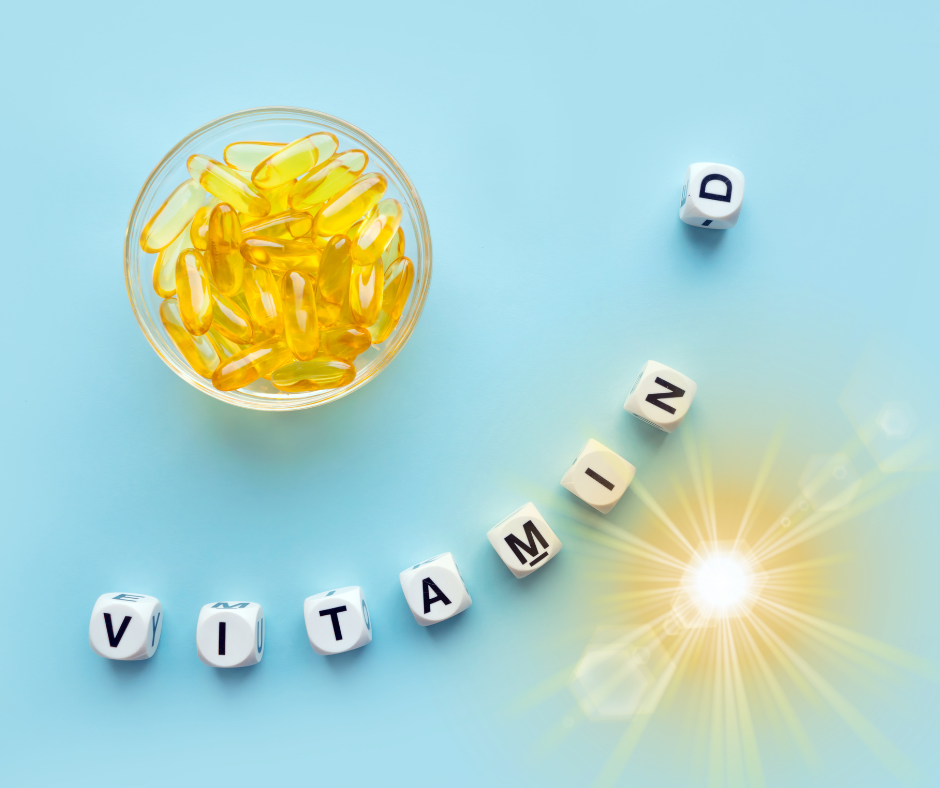
What is Vitamin D and Why is it so Vital?
If I seriously just had to take ONE vitamin it would be vitamin D! Why? Vitamin D is a fat-soluble vitamin that plays a crucial role in maintaining the health of your bones and immune system. It helps the body absorb calcium and phosphorus from the gut, which are essential for strong bones and teeth. Vitamin D also supports muscle function and the nervous system.
When I was diagnosed with MS I was SEVERELY LOW in Vitamin D. I didn’t know then how vital it was. NOW I DO! It’s crucial for maintaining overall health, primarily because it facilitates the absorption of calcium and phosphorus, essential minerals for building and maintaining strong bones and teeth. Without adequate vitamin D, bones can become thin, brittle, or misshapen, leading to conditions like rickets in children and osteomalacia in adults. Beyond bone health, vitamin D plays a critical role in supporting the immune system, helping the body defend against infections and inflammation. It also contributes to muscle function and has been linked to the prevention of chronic diseases, like autoimmune diseases including heart disease, diabetes, and certain cancers. Given its diverse and essential functions, maintaining adequate levels of vitamin D is important for long-term health and well-being.
Here are many reasons why vitamin D is needed:
- Bone Health: Essential for the absorption of calcium and phosphorus, which are crucial for strong bones and teeth.
- Prevention of Bone Disorders: Helps prevent rickets in children and osteomalacia in adults, both of which result from weakened bones.
- Immune Support: Plays a significant role in boosting the immune system, helping the body fight infections and reducing inflammation.
- Muscle Function: Supports muscle strength and function, which is important for mobility and overall physical health.
- Chronic Disease Prevention: Linked to a lower risk of developing chronic conditions such as heart disease, diabetes, and certain cancers.
- Mood Regulation: May influence mood and mental health, with some studies suggesting a role in preventing depression.
- Skin Health: Produced by the skin in response to sunlight, making sun exposure an important source of vitamin D.
- Overall Well-Being: Contributes to general health and well-being by supporting multiple bodily systems.
There are 2 types of vitamin D.
Vitamin D2 (ergocalciferol) and Vitamin D3 (cholecalciferol) are two different forms of vitamin D, each with distinct sources, potency, and roles in the body:
Source:
Vitamin D2 (Ergocalciferol):
- Found in plants, fungi, and yeast.
- Commonly sourced from mushrooms exposed to sunlight or ultraviolet light.
- Often used in fortified foods and some supplements.
Vitamin D3 (Cholecalciferol):
- Produced naturally in the skin when exposed to sunlight, specifically ultraviolet B (UVB) rays.
- Found in animal-based foods like fatty fish (e.g., salmon, mackerel), fish liver oils, egg yolks, and fortified dairy products.
- Also used in most vitamin D supplements.
Potency and Efficacy:
Vitamin D2:
- Generally considered less potent than D3.
- Has a shorter duration of action in the body, meaning its levels decrease more quickly over time.
- May be less effective at raising and maintaining overall vitamin D levels in the blood.
Vitamin D3:
- More potent and effective at raising and maintaining blood levels of vitamin D.
- Longer duration of action, making it more efficient in sustaining adequate vitamin D levels.
- Preferred form for supplementation, especially for correcting deficiencies.
Role in the Body:
- Both D2 and D3 are converted in the liver to 25-hydroxyvitamin D (calcidiol), the form measured in blood tests to assess vitamin D status.
- Calcidiol is further converted in the kidneys to its active form, 1,25-dihydroxyvitamin D (calcitriol), which helps regulate calcium and phosphorus levels in the body, supporting bone health and other functions.
Absorption factor - Take vitamin D with K2!
When absorbing Vitamin D, it is crucial for maintaining strong bones and overall health, but its effectiveness is significantly enhanced when paired with Vitamin K2. While Vitamin D boosts the absorption of calcium from the diet into the bloodstream, Vitamin K2 ensures that this calcium is directed to the bones and teeth, where it’s needed most, rather than being deposited in the arteries or soft tissues. This synergy between D and K2 not only promotes optimal bone health and density but also protects cardiovascular health by preventing harmful calcium buildup in the arteries. Together, Vitamin D and K2 form a powerful duo that supports both skeletal strength and heart health, making their combined supplementation particularly beneficial.
I hope you learned how important vitamin D is. Most people are deficient in this important vitamin (a long with many others). It’s important to test—sending in a hair analysis is easy! Contact me if you want to do this.
Adrienne
x o
Nourish Your Way to Health – cookbook
The Path to Reverse Multiple Sclerosis Naturally – paperback book
MS Warrior
Multiple Sclerosis is reversible
Autoimmune diseases are reversible
